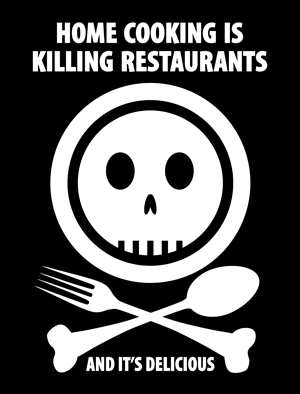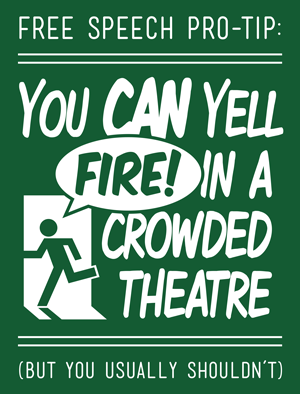from the no-it-isn't dept
In 2010, Mike Masnick wrote a post in which he made the analogy between the silly notion that the home taping of music was killing the recording industry and the oft-cited joke that home cooking must be killing the restaurant industry as well. Well, while we were all having a good laugh and slapping ourselves on our collective backs for our clever ingenuity, France suddenly had its restaurant industry under assault by, you guessed it, home cooking. Well, kind of home cooking, at least.
So now it's the turn of the restaurateurs to join the hoteliers and taxi drivers in getting furious with what they see as upstart competitors. Restaurant owners in Paris are furious with chefs who have started catering for diners in their own homes - traditional eateries say they could be put out of business as websites put customers directly in touch with cooks.
So, like Airbnb and Uber before it, there are startup websites, such as VizEat, that allow locals and tourists alike to book dinners in people's homes for a home-cooked meal. Hosts sign up to prepare and host these meals in their homes, users can browse through those hosts' menus and cooking capabilities, and book a dinner. You know, like a restaurant, except in a home. Meal-sharing, they're calling it, because everything has to be sharing apparently. And trade groups representing French restaurants are
pissed and are in fact appealing to the French government to step in and make sure they can keep making money in the face of this useful service that people apparently like.
The main Paris restaurateurs' union Synhorcat has appealed to the French government to take steps to curb the phenomenon, arguing that bistros and brasseries risk being put out of business.
"In the space of three years Airbnb has tripled its presence in Paris - to the point that there are now 50,000 flats advertised on its website," Synhorcat's president Didier Chenet tells me. He says small and medium-sized hotels have been hit hard and over the summer they had to drop their prices. "If the government doesn't do something to stop the underground restaurants, it will be the same disaster. There are people out there offering a service which is identical to restaurants: a choice of starters, main courses, desserts, wine, the works. But they pay no rent, no staff, no taxes - it is completely illegal," says Chenet. "And if you want to set up a real restaurant, you need qualifications: how to deal with allergens; how to deal with alcohol. Do these people realise that if a customer drink-drives after a meal, they - the chefs - are partly responsible?"
Everyone should be instantly able to see how absolutely stupid this line of thought is. First, if there are legal liability issues for allergens and alcohol, there are already laws in place for that where they ought to apply. As for not paying rent, where does Chenet think the space for these in-home meals come from? The ether? The staff
is being paid, too, as the staff is the host hosting the meal. Taxes? Well, if I order pizza and friends chip in for it, am I required to pay taxes on that? Not a perfect analogy, but if the only argument against this is taxation, that is easily remedied.
And, really, the base concept that meal-sharing is an identical experience to eating at a restaurant is monumentally silly. The proper analogy here isn't Uber, it's the movie theater business. Home entertainment centers are ubiquitous, but movie theaters have survived these past few decades. Why? Well, because the experience of the theater can't be fully replicated in the home. I would think this would be all the more true in the case of restaurants, where the quality of the food and atmosphere are even more paramount than they are in the experience of watching a movie.
"Our chefs are amateurs, and when they sign up they undertake to do this on an occasional basis," says Camille Rumani, Vizeat's co-founder. "The idea is that people visiting a city - or indeed people living there - can search out a more authentic experience, one in which they can have a proper exchange with local people and make new friends. It is not competition for restaurants. It is a new market we are opening up."
That's so obviously true, it's a wonder it actually has to be stated. Restaurants shouldn't feel threatened at all, nevermind trying to get the government to shut down a not-really-competitor for no good reason.
Filed Under: competition, cooking, home cooking, innovation
Companies: vizeat






